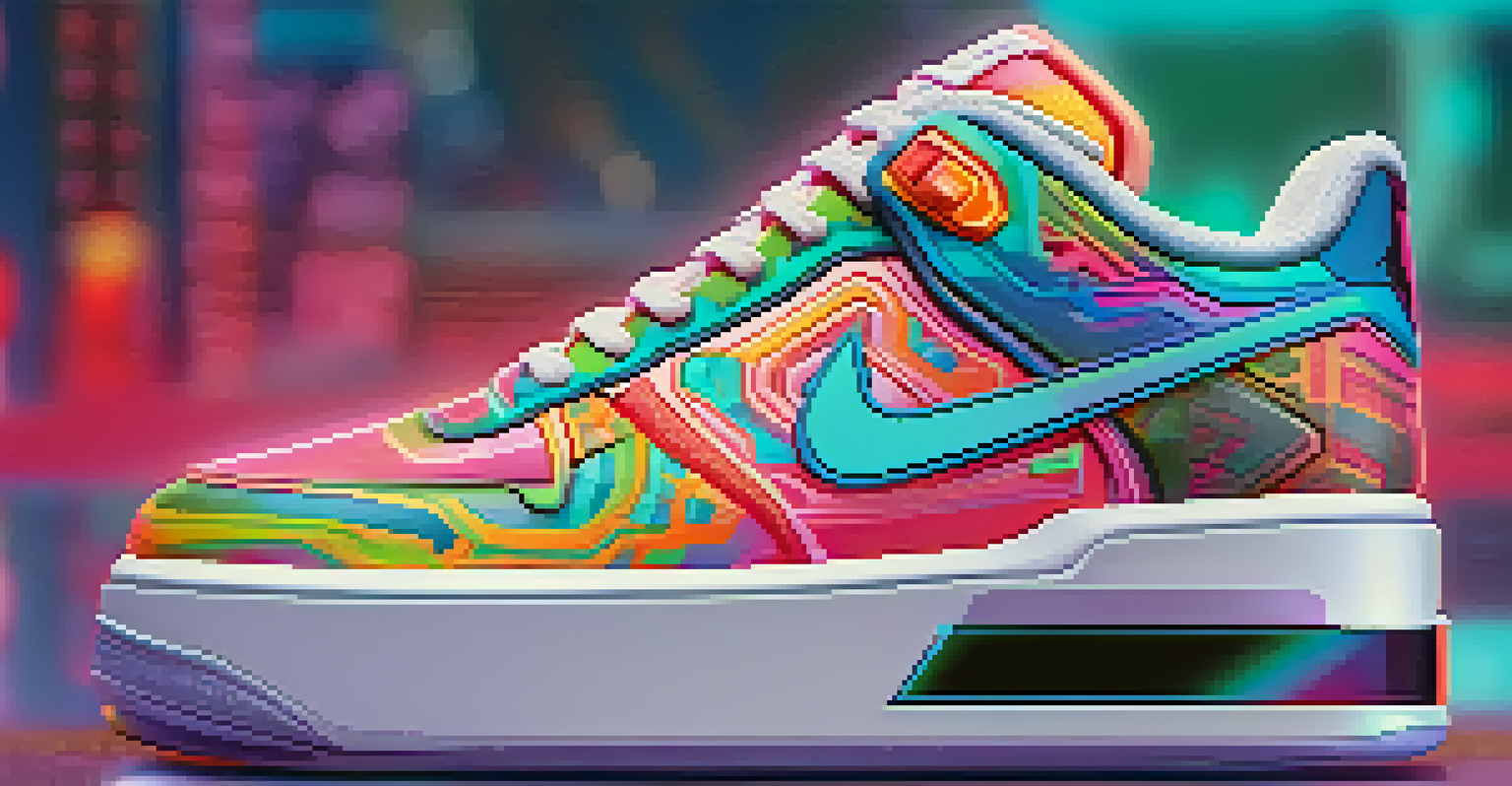How NFTs Are Revolutionizing E-Commerce and Digital Shopping

Understanding NFTs: The Basics Explained
NFTs, or Non-Fungible Tokens, are unique digital assets that represent ownership of a specific item or piece of content, often verified using blockchain technology. Unlike cryptocurrencies such as Bitcoin, which are interchangeable, NFTs are one-of-a-kind and cannot be exchanged on a one-to-one basis. This uniqueness is what makes NFTs particularly valuable in the realm of digital shopping.
NFTs are not just a trend; they represent a new era of ownership and authenticity in the digital world.
Imagine owning a rare baseball card; its value comes from its scarcity and authenticity. Similarly, an NFT can represent digital art, music, or even virtual real estate, giving buyers a sense of ownership and connection to something that can’t be replicated. This concept is gaining traction in e-commerce, as brands explore how to leverage NFTs to enhance customer experiences.
As more people become familiar with NFTs, their potential applications in online shopping continue to expand. Understanding the basics sets the stage for exploring how these digital assets are revolutionizing e-commerce and changing the way we shop.
NFTs Enhance Product Authenticity and Ownership
One of the key benefits of NFTs in e-commerce is their ability to provide verifiable proof of authenticity. In a world where counterfeit products can easily flood the market, NFTs can act as a digital certificate of authenticity, assuring customers that they are purchasing genuine items. This is especially important for luxury brands and collectibles.

For instance, imagine buying a designer handbag that comes with an NFT confirming it as a limited edition piece. This not only gives you confidence in your purchase but also enhances its resale value. Buyers feel more secure knowing their investment is backed by an immutable record on the blockchain.
NFTs Ensure Product Authenticity
NFTs provide verifiable proof of authenticity, assuring customers they are purchasing genuine items in a market often filled with counterfeits.
As brands adopt this technology, customers are likely to become more discerning, seeking out NFTs as a means of ensuring product authenticity. This trend is reshaping the relationship between consumers and brands, fostering a greater sense of trust in the digital shopping experience.
Creating Unique Shopping Experiences with NFTs
NFTs allow brands to offer more than just products; they can provide unique experiences that engage customers on a deeper level. By incorporating NFTs into their offerings, businesses can create exclusive content, limited-edition products, and even virtual events. This shift is not just about selling goods but about building a community around the brand.
The future of shopping is not just about products, but about experiences that connect brands and consumers in meaningful ways.
For example, a fashion brand might release a limited collection of virtual outfits as NFTs that customers can use in online games or social media platforms. This innovative approach not only attracts tech-savvy consumers but also enhances brand loyalty. Customers are drawn to the idea of owning something exclusive that sets them apart.
As more companies experiment with these immersive shopping experiences, we can expect to see an evolution in how consumers interact with brands, leading to a more dynamic and engaging digital marketplace.
NFTs and the Rise of Digital Collectibles
Digital collectibles are becoming a significant trend in the NFT space, attracting both collectors and casual buyers alike. From virtual trading cards to unique artwork, these digital items offer a new way for consumers to engage with their favorite brands and creators. The thrill of collecting, once reserved for physical items, has now found a home in the digital realm.
Imagine a scenario where you can collect limited-edition digital sneakers released by your favorite brand. Each pair comes with its own NFT, making it a sought-after item among fans. This not only encourages repeat purchases but also fosters a sense of community among collectors who share their rare finds online.
NFTs Create Unique Brand Experiences
Brands can leverage NFTs to offer exclusive content and limited-edition products, fostering deeper customer engagement and loyalty.
As digital collectibles gain popularity, e-commerce platforms are likely to evolve, providing more space for these unique items. This shift is changing how consumers view ownership and value in the digital age.
NFTs as Tools for Brand Loyalty and Engagement
Brands are leveraging NFTs to create innovative loyalty programs that reward customers for their engagement. By offering NFTs as part of loyalty incentives—such as discounts, exclusive access, or limited-edition products—companies can deepen their relationship with consumers. This strategy not only boosts customer retention but also encourages new purchases.
For instance, a beauty brand might offer an NFT that grants holders early access to new product launches or exclusive virtual beauty tutorials. This creates a sense of belonging and excitement among customers, motivating them to remain loyal to the brand.
As more businesses recognize the potential of NFTs in fostering loyalty, we can expect to see a shift in how brands connect with their audience. This could lead to a more personalized shopping experience, where customers feel valued and engaged.
Challenges Facing NFTs in E-Commerce
While the potential of NFTs in e-commerce is vast, there are challenges that brands must navigate. Issues such as environmental concerns related to blockchain technology and the volatility of NFT markets can deter both businesses and consumers. It's essential for brands to address these concerns transparently to build trust.
For example, some NFTs are minted on energy-intensive blockchains, raising questions about their environmental impact. Brands that prioritize sustainability may seek alternative solutions, such as using eco-friendly blockchain platforms or offsetting their carbon footprint.
Challenges in NFT Adoption Persist
Brands face challenges like environmental concerns and market volatility that must be addressed to ensure successful NFT integration in e-commerce.
Navigating these challenges will be crucial for the long-term success of NFTs in e-commerce. By being proactive and addressing these concerns, brands can ensure that their NFT initiatives resonate positively with consumers.
The Future of NFTs in Digital Shopping
As we look ahead, the future of NFTs in e-commerce appears promising. With advancements in technology and growing consumer interest, we can anticipate more innovative applications of NFTs in the digital shopping space. This could range from virtual marketplaces that support NFT transactions to enhanced customer experiences through augmented reality.
Imagine shopping in a virtual store where you can view and interact with products as NFTs before making a purchase. This immersive experience could transform online shopping, making it more engaging and enjoyable. As technology continues to evolve, so too will the ways in which consumers shop.

Ultimately, NFTs have the potential to redefine the e-commerce landscape, creating new opportunities for brands and consumers alike. The revolution is just beginning, and it’s an exciting time to be part of this digital shift.